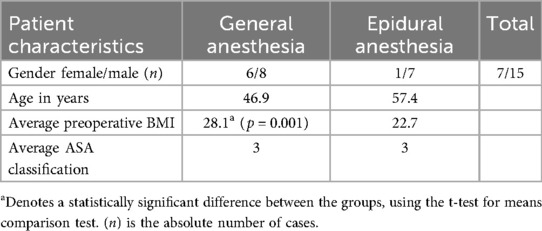- 1Department of Surgery, Burjeel Hospital, Abu Dhabi, United Arab Emirates
- 2Department of Anesthesia, Burjeel Hospital, Abu Dhabi, United Arab Emirates
Background: There is some evidence to suggest that general anesthesia may influence oncological outcomes, such as survival and disease-free recurrence, in addition to surgical outcomes. This study compares the clinico-oncological outcomes of pancreatic cancer patients who had a pyloric-preserving pancreaticoduodenectomy (PPPD) under epidural anesthesia without endotracheal intubation (EA) and those who received general anesthesia (GA).
Methods: A retrospective cohort investigation comparing pancreatic cancer patients with PPPD under GA and EA. The procedure's feasibility and 30-day clinico-pathological outcomes were evaluated between groups.
Results: The ratio of males to females was 16:5. The mean age was 51 years (range 27–74 years). The median hospital stay was 12 days (range 7–60). In the GA group, thirteen patients had PPPD and one patient received total pancreatectomy with splenectomy (TPS). On the other hand, in the EA group, six patients received PPPD and two patients underwent TPS. The two groups had similar preoperative demographics, including ASA classification. Seven EA patients underwent successful surgery without GA conversion. Due to respiratory acidosis, one TPS patient was converted to GA before abdominal closure. Neither group had mortality or major cardio-pulmonary issues, with the exception of one case in the GA group who acquired COVID-19 while hospitalized and was ventilated for 10 days until completely recovering. Surgical complications occurred as follows: Two GA patients had pancreatic fistula type B, and one EA patient had a biliary leak, both treated conservatively. One GA patient needed a revision laparoscopy after an iatrogenic bowl perforation during IR drain insertion for chylous ascites on postoperative day 30. All cases had an R0 resection. The histological tumor stage was similar in both groups. The EA group had significantly more harvested lymph nodes and a higher number of lymph node metastases (p = 0.022 and P = 0.005, respectively).
Conclusions: Pancreaticoduodenectomy with just epidural anesthesia and without endotracheal intubation can be performed safely in selected cases. It may decrease surgical complications without affecting oncological outcomes. Additional research is necessary to comprehend its actual advantages.
1 Introduction
Pancreatic cancer remains one of the most aggressive malignancies, with surgical resection serving as the only potentially curative treatment despite dismal long-term survival rates (1). Pancreaticoduodenectomy (PD) is central to curative therapy; however, the perioperative period is critical, as the anesthetic technique employed can significantly influence immune function and tumor biology. General anesthesia (GA) with endotracheal intubation triggers a robust neuroendocrine stress response, resulting in elevated catecholamines and pro-inflammatory cytokines that may impair natural killer cell function and promote tumor dissemination (2, 3). Moreover, GA induces significant alterations in the plasma metabolome, which can further impact tumor behavior (4). In contrast, epidural anesthesia (EA) attenuates these adverse responses, providing superior postoperative pain control and fostering a more favorable immunologic and metabolic milieu (5–7).
Emerging evidence suggests that the anesthetic technique used during oncologic surgery may significantly influence both perioperative and long-term cancer outcomes. GA with endotracheal intubation provokes a pronounced stress response—and is associated with deleterious metabolomic shifts—that may impair immune function and promote tumor dissemination, while EA mitigates this neuroendocrine response and may favorably modulate tumor biology (8–11).
Additionally, Chen et al. reported that intraoperative epidural Ropivacaine infusion positively impacted oncological outcomes in pancreatic cancer patients (12). However, a meta-analysis by Ang et al. neither supports nor refutes the association between the use of regional anesthesia and a lower incidence of cancer recurrence compared to GA in oncological resections (13).
Hence, optimal surgical stress management necessitates the implementation of the most effective anesthetic techniques. Potent pain management, prompt mobilization, and swift recovery are recommended to decrease the occurrence of complications as well as tumor recurrence. Historical studies by Nakashima et al. (14) and Ueo et al. demonstrated the feasibility of performing major abdominal surgery under EA without endotracheal intubation—even in elderly patients (15). Subsequent recent research, such as the pilot study on neuraxial anesthesia in hepato-pancreato-biliary surgery have provided additional evidence of the feasibility of the utilization of EA alone for complex hepatobiliary and pancreatic surgery (16). This prompted several research groups to assess the impact of epidural analgesia on short-term postoperative clinical and oncological outcomes in prospective controlled trials involving pancreatic surgeries (17, 18).
In light of these observations, this study aims to assess the feasibility and compare the early clinico-oncological outcomes in pancreatic cancer patients undergoing pylorus-preserving pancreaticoduodenectomy (PPPD) performed under epidural anesthesia without endotracheal intubation (EA) vs. those receiving general anesthesia (GA).
2 Materials and methods
2.1 Study design and patient selection
A retrospective cohort study was conducted at Burjeel Hospital, Abu Dhabi. The institutional review board approved this study, and informed consent was obtained from all patients. We included pancreatic cancer patients who underwent either PPPD or total pancreatectomy with or without splenectomy (TPS) between January 2015 and December 2022. Patient selection for epidural anesthesia (EA) vs. general anesthesia (GA) was based on a comprehensive preoperative assessment, which included anesthesiologist evaluation, patient preference, and the availability of M.I., an expert in regional anesthesia, who provided guidance on the feasibility of EA for each case. All patients who met the inclusion criteria and underwent pancreaticoduodenectomy at our institution during the study period were consecutively included
Patients were stratified as follows:
2.1.1 Epidural anesthesia without Ga
Patients underwent continuous monitoring utilizing standard equipment, which included blood pressure measurement, pulse oximetry, electrocardiography, temperature assessment, and end-tidal CO2 analysis. Before the procedure, a central line catheter was inserted in the internal jugular vein and patients were administered a fluid load of 1 L of Ringer's lactate, in addition to 1 mg of midazolam and 50 µg of fentanyl. The epidural catheter was inserted under strict sterile conditions. After positioning the patient in the sitting position, the insertion site (T6–T7 interspace) was disinfected with chlorhexidine solution and sterile fenestrated draping was applied. Using an 18G Tuohy needle, the epidural space was identified via the loss-of-resistance technique. A test dose of 3 ml of 2% lidocaine was administered to exclude intrathecal or intravascular placement. A sterile catheter was then advanced 4 cm into the epidural space. The catheter was then secured with sterile dressings. Then, an 8 ml bolus of 0.5% Ropivacaine was administered, succeeded by 150 µg morphine in the epidural space. A continuous infusion of 0.25% Ropivacaine was subsequently maintained at a rate of 7 ml per hour. An arterial line was inserted into the left radial artery, and to maintain a mean arterial pressure above 65 mmHg, a continuous infusion of noradrenaline at an average dosage of 0.12 ± 0.06 mcg/kg/min was used to control sympathetic blockade-induced hypotension. Sedation involved low-dose midazolam or dexmedetomidine as needed (Figure 1). After surgery, all patients received 4 mg intravenous ondansetron to prevent postoperative nausea and vomiting (PONV).
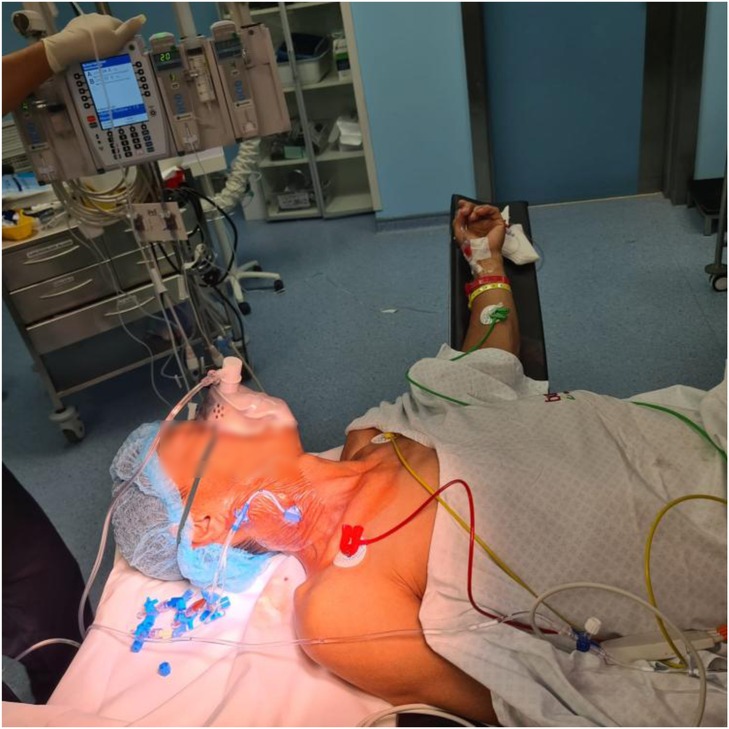
Figure 1. Patient after placement of thoracic epidural catheter receiving supplemental oxygen via a face mask, with a central venous catheter placed in the right internal jugular vein and an arterial line in the left radial artery for continuous hemodynamic monitoring.
2.1.2 General anesthesia protocol with endotracheal intubation and mechanical ventilation
Patients were continuously monitored using standard equipment, including blood pressure measurement, pulse oximetry, electrocardiography, temperature assessment, and end-tidal CO₂ analysis. Prior to induction, intravenous access was secured and patients received a fluid load of 1 L of Ringer's lactate, along with appropriate premedication (2 mg of midazolam and 50 µg of fentanyl). Following preoxygenation, anesthesia was induced using intravenous agents—typically propofol—and neuromuscular blockade was achieved with a suitable agent (rocuronium) to facilitate endotracheal intubation. Endotracheal intubation was then performed under direct visualization of both vocal cords, and anesthesia was maintained with a volatile agent (sevoflurane) in an oxygen–air mixture, supplemented with additional opioids as needed. Standard monitoring was continuously maintained throughout the procedure. In this group, an epidural catheter was also inserted prior to intubation using the same technique as mentioned above and maintained in both groups for 3–5 days to provide postoperative analgesia, and the patients were extubated and then moved to the intensive care unit for short-term observation. The postoperative pain management was accomplished using a PCEA with ropivacaine 0.2% and fentanyl (2 mcg/ml), basal rate 6–8 ml/hr, 3 ml bolus, and 15 min lockout. This is the institutional standard for pancreatic surgeries under ERAS protocol.
2.2 Surgical techniques of pylorus-preserving pancreaticoduodectomy (PPPD)
A median laparotomy or roof-top incision was used to gain access, with a Condor Abdominal Retractor employed to optimize exposure. Dissection was facilitated by the use of Harmonic and LigaSure energy devices, ensuring precise tissue division and hemostasis. Vascular clips were applied for vessel control, and anastomoses were performed using PDS 3.0 and 4.0 sutures. Reconstruction is achieved through a pancreatico-gastrostomy, incorporating a duct tube to maintain pancreatic duct patency and promote effective drainage, all while preserving the pylorus for optimal gastrointestinal continuity (Figure 2).
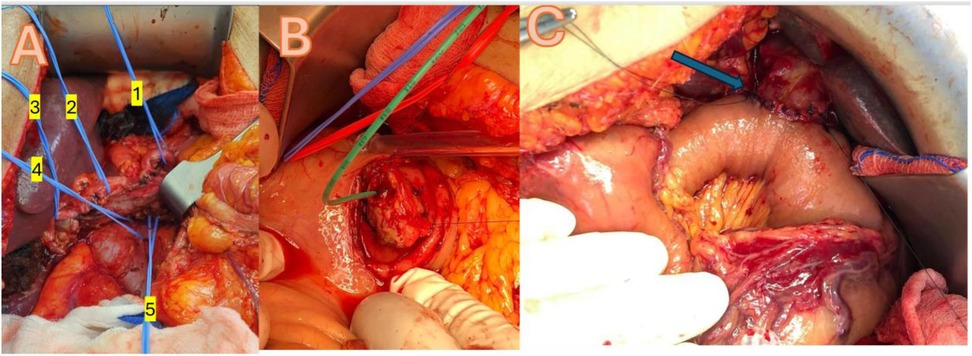
Figure 2. (A), Extensive dissection with looping of all important vascular structures: 1 = splenic artery, 2 = common hepatic artery, 3 = proper hepatic artery, 4 = left renal vein, 5 = mesenteric superior artery; (B), pancreatic tail inavaginated through posterior wall of stomach with green pancreatic duct tube; (C), blue arrow shows completed roux and Y hepaticojejunostomy with PDS 4.0 in interrupted single stitch technique.
2.3 Data collection
Data collected included demographic variables (age, gender, ASA classification), operative details (procedure type, duration, conversion rates), postoperative outcomes (hospital stay, complications, ICU admissions), and oncologic parameters (R0 resection status, lymph node yield, histological tumor stage). Postoperative complications were graded using standard criteria, and pain management efficacy was assessed via patient-reported pain scores and analgesic requirements.
2.4 Statistical analysis
Student's t-test was used to compare the mean values of continuous variables. When the sample size was small, we used the chi-squared test to compare continuous variables, and Fisher's exact test for categorical variables. Non-parametric variables were distinguished between groups using the Mann–Whitney test. The statistical test ANOVA was used to assess whether there were any statistically significant differences among the mean values of the three groups. SPSS 29.0 was used for all statistical testing (IBM, SPSS® Chicago, IL, USA). To draw conclusions from the data, a p-value of less than 0.05 was considered statistically significant.
3 Results
3.1 Patient demographics and operative data
A total of 22 patients (15 males and 7 females) with a mean age of 50.7 years (range 27–74) were included. No significant differences in preoperative demographics, including ASA classification, were observed between the GA and EA groups, even though patients in the GA group had a higher body mass index (Table 1). The immunological parameter showed a trend towards the EA group without reaching statistical significance (Table 2).
In the GA group, 13 patients underwent PPPD and 1 underwent total pancreatectomy with splenectomy (TPS). In the EA group, six patients underwent PPPD and two underwent TPS. The average surgery time was significantly longer in the EA group (Figure 3). However, the average hospital stay was 17.6 days (range 8–44) without statistical difference between the two groups; moreover, the specific biochemical parameter did not differ between the two groups (Table 3).
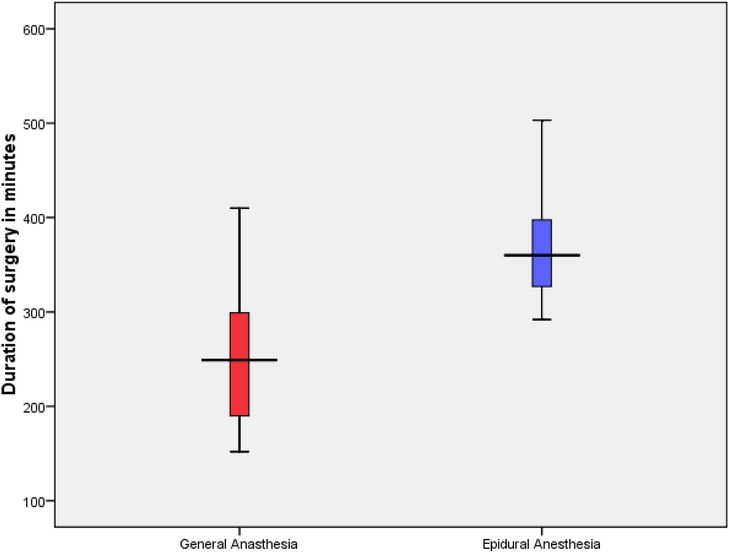
Figure 3. Comparison of duration of surgery of the GA and EA groups. Group statistics using independent t-test, p = 0.022.

Table 3. Comparison of early clinical outcome parameter of the GA and EA groups during hospital stay. Group statistics using independent t-test.
3.2 Feasibility and safety outcomes
In the EA group, seven patients completed the procedure entirely under epidural anesthesia without conversion (feasibility outcome), while one patient undergoing total pancreatectomy with splenectomy required conversion to general anesthesia due to intraoperative respiratory acidosis. The safety outcome included no mortality or major cardiopulmonary complications being observed during hospitalization, aside from one patient in the GA group who developed COVID-19 and required prolonged ventilation for 10 days before recovery. Overall, surgical complications were minimal: two GA patients developed pancreatic fistula type B, one EA patient experienced a biliary leak (all managed conservatively), and the COVID-positive GA patient underwent revision laparoscopy on postoperative day 30 for an iatrogenic bowel perforation following interventional radiology drain insertion for chylous ascites.
3.3 Oncological outcomes and postoperative complications
Therefore, short-term surrogate oncologic indicators such as R0 resection rate, number of harvested lymph nodes, lymph node ratio, and perioperative tumor marker trends were deliberately included in the analysis. These parameters reflect oncologic adequacy and early treatment response, allowing us to evaluate whether epidural anesthesia supports, or at the very least does not compromise, oncologic quality in patients undergoing major pancreatic head resections. All patients achieved an R0 resection. Moreover, the EA group demonstrated a significantly higher lymph node yield and a greater number of lymph node metastases (Table 4).
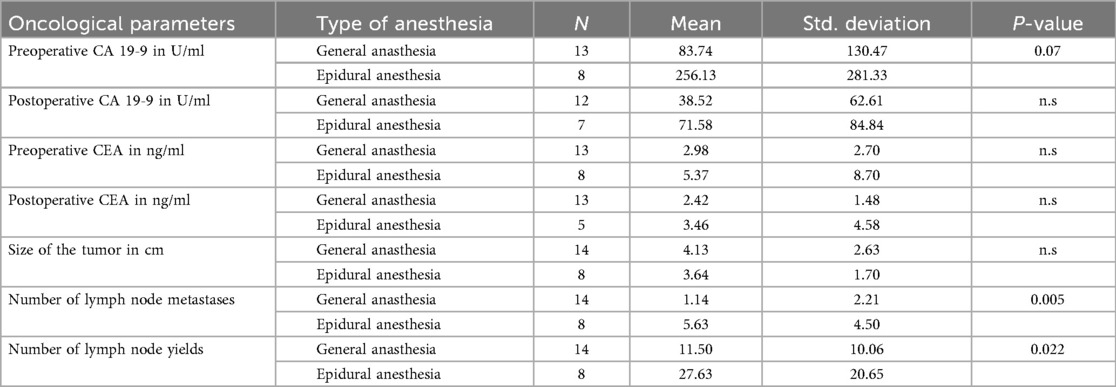
Table 4. Comparison of early oncological outcome parameter of the GA and EA groups during hospital stay. Group statistics using independent t-test.
4 Discussion
Pancreatic cancer remains one of the most lethal malignancies, with recurrence and metastasis posing significant challenges even after surgery. Emerging evidence indicates that the anesthetic techniques employed during cancer surgery may influence oncological outcomes by modulating the body's immune response, stress levels, and inflammatory processes, potentially affecting the risk of cancer recurrence and metastasis (19).
Our study demonstrates that pyloric-preserving pancreaticoduodenectomy performed under epidural anesthesia without endotracheal intubation is both feasible and safe in selected pancreatic cancer patients. The high rate of successful EA completion—with only one conversion due to respiratory acidosis—and even better oncological outcomes (as measured by tumor marker drop postoperatively, rate of lymph node metastasis, and total number of lymph node yields) indicate that EA does not compromise the surgical radicality required for effective treatment.
A major advantage of EA is its capacity to mitigate the perioperative neuroendocrine stress response. GA with intubation elevates catecholamines and inflammatory cytokines, which may impair natural killer cell function and promote tumor dissemination. Additionally, GA-induced metabolic alterations, as demonstrated by recent metabolomic studies, may further influence tumor behavior. In contrast, EA reduces these deleterious responses, thereby establishing a more favorable immunologic and metabolic environment. Recent evidence supports the beneficial role of EA in optimizing perioperative outcomes after pancreatic surgery (20).
However, Hou-Choun et al. reported that propofol anesthesia was associated with improved survival in open pancreatic cancer surgery compared to desflurane anesthesia, although their study was based on a limited sample size (21). Ren et al. found no significant difference in overall survival and disease-free survival between total intravenous anesthesia and volatile anesthesia (22). Furthermore, long-term outcomes from the PAKMAN randomized study revealed no significant survival difference between patients receiving perioperative thoracic epidural analgesia and those managed with patient-controlled intravenous analgesia (23).
Our study showed that patients in the EA group had a tendency towards a longer hospital stay compared to those in the GA group, although this difference was not statistically significant, and there was no associated increase in morbidity. These findings align with previous research, which reported that epidural analgesia was linked to a prolonged length of stay—most notably affecting early discharge in patients undergoing open pancreaticoduodenectomy and distal pancreatectomy (24).
Our study demonstrated that EA is a safe and feasible technique for complex pancreatic head resections. No major technical drawbacks were observed, and EA was successfully performed in all cases except one, which required conversion to GA at the end of surgery due to respiratory acidosis. Our cohort, consisting solely of patients with malignant pancreatic head cancer, is comparable to many series reported in the literature. The mean operative time of 300 ± 87 min was within the range of previously published data and was not adversely affected by the absence of neuromuscular blockade (16, 25). Additionally, the use of EA did not increase the risk of bleeding or compromise hemodynamic stability. Despite minor challenges related to the patient's breathing, no significant issues occurred during the most complex surgical maneuvers, including the management of major vessels and lymphadenectomies, as shown in Figure 2.
Effective pain control was achieved in all cases, enabling early mobilization and timely resumption of oral intake. In both groups no patient died within the first 90 days after discharge, although long-term survival data were unavailable due to the multicultural composition of our cohort. There were no significant differences in postoperative inflammatory or tumor markers between the groups. Only one patient required conversion from EA to GA at the end of the procedure, likely due to an anesthesiologist handover driven by hospital working hours policy rather than respiratory acidosis, and this conversion was performed smoothly. The overall cohort experienced a longer hospital stay compared to more recent studies (26–27), primarily due to the pivotal nature of this study and the wide geographical referral of patients, which necessitated a more cautious approach to discharge. However, the length of stay remained comparable to that reported in studies from the past decade (28).
Our study is the first to compare anesthesia type with lymph node yield and metastatic ratio in major abdominal procedures such as pancreatic head resection. While most research has focused on surgical technique, specimen processing, or neoadjuvant therapy as determinants of lymph node yield, our findings demonstrate that even major pancreatic resections yield more lymph nodes and higher lymph node metastasis detection when performed under epidural anesthesia—without endotracheal intubation or muscle relaxants—indicating that this anesthesia approach does not compromise oncological radicality. In selected cases with tumor involvement of both the pancreatic head and body, total pancreatosplenectomy (TPS) was performed based on intraoperative frozen section analysis of resection margins. Given that TPS was more frequently performed in the EA group, this may have contributed to differences in total lymph node yield between groups and lower rate of postoperative pancreatic fistula.
A recent study by Leoni et al. (29) advocated for the use of neuraxial awake anesthesia in 16 emergency laparotomies for acute intestinal disorders during the COVID-19 pandemic to minimize SARS-CoV-2 aerosolization associated with general anesthesia. All patients in the study underwent resections of the small bowel or left colon, typically executed through a periumbilical or lower midline incision, thereby avoiding the need for upper abdominal laparotomy, which may compromise ventilation and impact the subcostal nerves, which is the case in our series. Furthermore, the damage-control procedures exhibit notable differences compared to complex pancreatic surgeries, which require extensive retroperitoneal dissection around major vascular structures such as the superior mesenteric artery, portal vein, and celiac axis, as well as intricate pancreaticobiliary and intestinal reconstruction. Leoni et al. concentrated on life-saving outcomes; however, their study did not consider oncological issues, and it remains unspecified whether some emergency cases involved malignancy. Conversely, this study focuses on oncological outcomes.
Finally, a propensity-weighted analysis in renal cell carcinoma by Yen et al. illustrates that the association between anesthetic modality and oncological outcomes may vary by tumor type. These diverse findings underscore the complex interplay between anesthetic technique and oncological outcomes (30).
This study is limited by its small sample size, retrospective design, and potential selection bias. Patients in the epidural anesthesia (EA) group had significantly lower BMI compared to the general anesthesia (GA) group, which could influence perioperative outcomes. Although EA may have immunomodulatory benefits compared to GA, our small retrospective study was not designed to assess inflammatory or immune responses, so no conclusions on this aspect can be drawn. Consequently, our findings should be interpreted as exploratory and focused primarily on feasibility and safety rather than efficacy.
5 Conclusions
Our study supports the safety and feasibility of performing major pancreatic head resections for cancer under epidural anesthesia without endotracheal intubation. We found that this approach does not significantly increase morbidity or mortality compared to procedures conducted under general anesthesia. Additionally, short-term oncological outcomes, including complete tumor resection and the percentage reduction in tumor markers postoperatively, were similar between the two groups. The EA group showed a higher incidence of lymph node metastases and a greater total lymph node yield during major pancreatic resection, indicating potentially improved short-term oncological outcomes in this cohort.
However, to establish definitive conclusions regarding long-term outcomes, larger randomized controlled trials are needed. These studies will provide further insights into the efficacy and long-term oncological benefits of epidural anesthesia in pancreatic surgery, ultimately guiding clinical practice and optimizing patient outcomes.
Data availability statement
The original contributions presented in the study are included in the article/Supplementary Material, further inquiries can be directed to the corresponding author.
Ethics statement
The studies involving humans were approved by this study was performed in accordance with the Declaration of Helsinki, and was approved by the Institutional Review Board and Ethics Committee of Burjeel Hospital in Abu Dhabi (BH/REC/Institutional Review Board/033/22, on 20th February 2024). All patients who took part in this study signed a written informed consent form when they were admitted. Informed consent was obtained from all subjects involved in this study. The studies were conducted in accordance with the local legislation and institutional requirements. Written informed consent for participation was not required from the participants or the participants’ legal guardians/next of kin in accordance with the national legislation and institutional requirements.
Author contributions
IH: Validation, Project administration, Methodology, Visualization, Supervision, Formal Analysis, Investigation, Conceptualization, Software, Writing – original draft, Writing – review & editing, Resources. LH: Writing – original draft, Data curation, Writing – review & editing. IG: Formal Analysis, Writing – review & editing, Validation. MI: Methodology, Conceptualization, Writing – review & editing. WH: Conceptualization, Writing – review & editing.
Funding
The author(s) declare that no financial support was received for the research and/or publication of this article.
Acknowledgments
We express our gratitude to the Burjeel Holdings founder and chairman, Shamsheer Vayalil, who is both the impetus behind our mission to improve the level of service that we provide to the community, as well as our primary source of inspiration and the motivation for carrying on our work. Additionally, we thank John Sunil, Waleed Tawfik, Mohamed Shihabuddin, and Deepan Gd, who make up the senior management team at Burjeel Hospital, for guiding us with their passionate support, insightful comments, and constructive criticism about this research.
Conflict of interest
The authors declare that the research was conducted in the absence of any commercial or financial relationships that could be construed as a potential conflict of interest.
Generative AI statement
The author(s) declare that no Generative AI was used in the creation of this manuscript.
Any alternative text (alt text) provided alongside figures in this article has been generated by Frontiers with the support of artificial intelligence and reasonable efforts have been made to ensure accuracy, including review by the authors wherever possible. If you identify any issues, please contact us.
Publisher's note
All claims expressed in this article are solely those of the authors and do not necessarily represent those of their affiliated organizations, or those of the publisher, the editors and the reviewers. Any product that may be evaluated in this article, or claim that may be made by its manufacturer, is not guaranteed or endorsed by the publisher.
References
2. Sessler DI, Riedel B. Anesthesia and cancer recurrence: context for divergent study outcomes. Anesthesiology. (2019) 130(1):3–5. doi: 10.1097/ALN.0000000000002506
3. Exadaktylos AK, Buggy DJ, Moriarty DC, Mascha E, Sessler DI. Can anesthetic technique for primary breast cancer surgery affect recurrence or metastasis? Anesthesiology. (2006) 105(4):660–4. doi: 10.1097/00000542-200610000-00008
4. Perioperative changes in the plasma metabolome of patients receiving general anesthesia for pancreatic cancer surgery. Oncotarget. (2021) 12:996–1010. doi: 10.18632/oncotarget.27956
5. Bassi C, Marchegiani G, Dervenis C, Sarr M, Abu Hilal M, Adham M, et al. The 2016 update of the international study group (ISGPS) definition and grading of postoperative pancreatic fistula: 11 years after. Surgery. (2017) 161(3):584–91. doi: 10.1016/j.surg.2016.11.014
6. Karim SAM, Abdulla KS, Abdulkarim QH, Rahim FH. The outcomes and complications of pancreaticoduodenectomy (whipple procedure): cross sectional study. Int J Surg. (2018) 52:383–7. doi: 10.1016/j.ijsu.2018.01.041
7. Macario A, Weinger M, Carney S, Kim A. Which clinical anesthesia outcomes are important to avoid? The perspective of patients. Anesth Analg. (1999) 89(3):652–8. doi: 10.1097/00000539-199909000-00022
8. Ramly MS, Buggy DJ. Anesthetic techniques and cancer outcomes: what is the current evidence? Anesth Analg. (2025) 140(4):768–77. doi: 10.1213/ANE.0000000000007183
9. Hiller JG, Perry NJ, Poulogiannis G, Riedel B, Sloan EK. Perioperative events influence cancer recurrence risk after surgery. Nat Rev Clin Oncol. (2018) 15(4):205–18. doi: 10.1038/nrclinonc.2017.194
10. Plücker J, Wirsik NM, Ritter AS, Schmidt T, Weigand MA. Anaesthesia as an influence in tumour progression. Langenbecks Arch Surg. (2021) 406(5):1283–94. doi: 10.1007/s00423-021-02078-z
11. Evans MT, Wigmore T, Kelliher LJS. The impact of anaesthetic technique upon outcome in oncological surgery. BJA Educ. (2019) 19(1):14–20. doi: 10.1016/j.bjae.2018.09.008
12. Chen W, Xu Y, Zhang Y, Lou W, Han X. Positive impact of intraoperative epidural ropivacaine infusion on oncologic outcomes in pancreatic cancer patients undergoing pancreatectomy: a retrospective cohort study. Cancer. (2021) 12(15):4513–21. doi: 10.7150/jca.57661
13. Ang E, Ng KT, Lee ZX, Ti LK, Chaw SH, Wang CY. Effect of regional anaesthesia only versus general anaesthesia on cancer recurrence rate: a systematic review and meta-analysis with trial sequential analysis. J Clin Anesth. (2020) 67:110023. doi: 10.1016/j.jclinane.2020.110023
14. Nakashima H, Ueo H, Takeuchi H, Arinaga S, Shibuta K, Tsuji H, et al. Pancreaticoduodenectomy under epidural anesthesia without endotracheal intubation for the elderly. Int Surg. (1995) 80(2):125–7. PMID: 8530226.
15. Ueo H, Takeuchi H, Arinaga S, Korenaga D, Furuta T, Tsuji H, et al. The feasibility of epidural anesthesia without endotracheal intubation for abdominal surgery in patients over 80 years of age. Int Surg. (1994) 79(2):158–62. PMID: 7928152.
16. Rocca A, Porfidia C, Russo R, Tamburrino A, Avella P, Vaschetti R, et al. Neuraxial anesthesia in hepato-pancreatic-bilio surgery: a first western pilot study of 46 patients. Updates Surg. (2023) 75(3):481–91. doi: 10.1007/s13304-022-01437-9
17. Pak LM, Haroutounian S, Hawkins WG, Worley L, Kurtz M, Frey K, et al. Epidurals in pancreatic resection outcomes (E-PRO) study: protocol for a randomised controlled trial. BMJ Open. (2018) 8(1):e018787. doi: 10.1136/bmjopen-2017-018787
18. Negrini D, Ihsan M, Freitas K, Pollazzon C, Graaf J, Andre J. The clinical impact of the perioperative epidural anesthesia on surgical outcomes after pancreaticoduodenectomy: a retrospective cohort study. Surg Open Sci. (2022) 10(suppl C):91–6. doi: 10.1016/j.sopen.2022.07.004
19. Choi H, Hwang W. Anesthetic approaches and their impact on cancer recurrence and metastasis: a comprehensive review. Cancers (Basel). (2024) 16(24):4269. doi: 10.3390/cancers16244269
20. Longo F, Panza E, Rocca L, Biffoni B, Lucinato C, Cintoni M, et al. Enhanced recovery after surgery (ERAS) in pancreatic surgery: the surgeon’s point of view. J Clin Med. (2024) 13:6205. doi: 10.3390/jcm13206205-
21. Lai HC, Lee MS, Liu YT, Lin KT, Hung KC, Chen JY, et al. Propofol-based intravenous anesthesia is associated with better survival than desflurane anesthesia in pancreatic cancer surgery. PLoS One. (2020) 15(5):e0233598. doi: 10.1371/journal.pone.0233598
22. Ren J, Wang J, Chen J, Ma Y, Yang Y, Wei M, et al. The outcome of intravenous and inhalation anesthesia after pancreatic cancer resection: a retrospective study. BMC Anesthesiol. (2022) 22(1):169. doi: 10.1186/s12871-022-01703-8
23. Klotz R, Ahmed A, Tremmel A, Büsch C, Tenckhoff S, Doerr-Harim , et al. Thoracic epidural analgesia is not associated with improved survival after pancreatic surgery: long-term follow-up of the randomized controlled PAKMAN trial. Anesth Analg. (2025) 140(4):798–810. doi: 10.1213/ANE.0000000000006812
24. Kim SS, Niu X, Elliott IA, Jiang JP, Dann AM, Damato LM, et al. Epidural analgesia improves postoperative pain control but impedes early discharge in patients undergoing pancreatic surgery. Pancreas. (2019) 48(5):719–25. doi: 10.1097/MPA.0000000000001311
25. Seiler CA, Wagner M, Bachmann T, Redaelli CA, Schmied B, Uhl W, et al. Randomized clinical trial of pylorus-preserving duodenopancreatectomy versus classical whipple resection-long term results. Br J Surg. (2005) 92(5):547–56. doi: 10.1002/bjs.4881
26. Takchi R, Cos H, Williams GA, Woolsey C, Hammill CW, Fields RC, et al. Enhanced recovery pathway after open pancreaticoduodenectomy reduces postoperative length of hospital stay without reducing composite length of stay. HPB (Oxford). (2022) 24(1):65–71. doi: 10.1016/j.hpb.2021.05.014
27. Nikfarjam M, Weinberg L, Low N, Fink MA, Muralidharan V, Houli N, et al. A fast track recovery program significantly reduces hospital length of stay following uncomplicated pancreaticoduodenectomy. JOP. (2013) 14(1):63–70. doi: 10.6092/1590-8577/1223
28. Xie YB, Wang CF, Zhao DB, Shan Y, Bai XF, Sun YM, et al. Risk factors associated with postoperative hospital stay after pancreaticoduodenectomy: a retrospective study. Chin Med J (Engl). (2013) 126(19):3685–9. doi: 10.3760/cma.j.issn.0366-6999.20130826
29. Leoni MLG, Rossi T, Mercieri M, Cerati G, Abbott DM, Varrassi G, et al. Emergency awake laparotomy using neuraxial anaesthesia: a case series and literature review. J Pers Med. (2024) 14(8):845. doi: 10.3390/jpm14080845
Keywords: pancreatic cancer, pyloric preserved pancreaticoduodenectomy, general anesthesia, epidural anesthesia, oncological outcomes, surgical complications
Citation: Hassan I, Hassan L, Gamal I, Ibrahim M and Hassan W (2025) Awake pancreaticoduodenectomy without intubation: exploring short-term clinicopathological outcomes of epidural vs. general anesthesia. Front. Surg. 12:1675019. doi: 10.3389/fsurg.2025.1675019
Received: 28 July 2025; Accepted: 22 September 2025;
Published: 8 October 2025.
Edited by:
Gabriel Sandblom, Karolinska Institutet (KI), SwedenReviewed by:
Aldo Rocca, University of Molise, ItalySivakumar Gananadha, Australian National University Research School of Psychology, Australia
Amita Sekhar Padhy, Homi Bhabha Cancer Hospital and Research Centre, India
Copyright: © 2025 Hassan, Hassan, Gamal, Ibrahim and Hassan. This is an open-access article distributed under the terms of the Creative Commons Attribution License (CC BY). The use, distribution or reproduction in other forums is permitted, provided the original author(s) and the copyright owner(s) are credited and that the original publication in this journal is cited, in accordance with accepted academic practice. No use, distribution or reproduction is permitted which does not comply with these terms.
*Correspondence: Iyad Hassan, dGh5cm9pZEBlbmRvY3JpbmUuYWU=
 Iyad Hassan
Iyad Hassan Lina Hassan1
Lina Hassan1